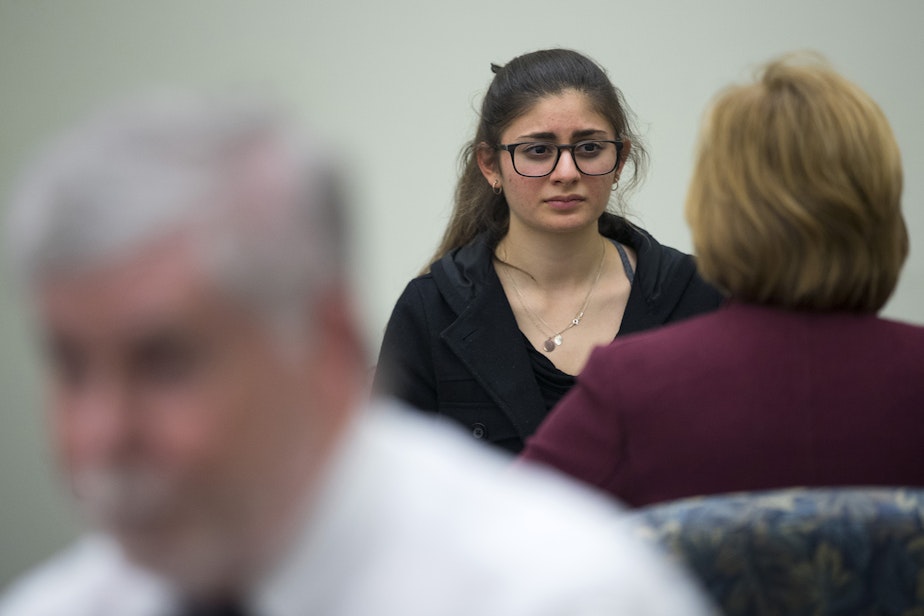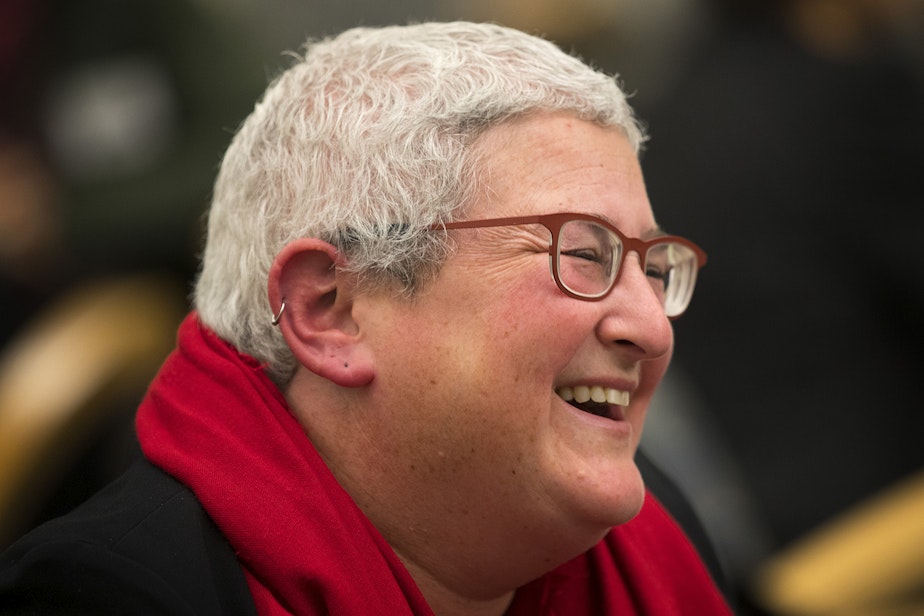'C' is for convicted. The new Scarlet Letter in Seattle
Plus: The toll and rewards of the bench ...
"Why do you think people commit crimes," Georgia Burns, a graduate student at Seattle University, asked. She was at the courthouse in downtown Seattle on Thursday evening, where more than a dozen judges had stayed late to answer people's questions in one-on-one conversations.
Judge Veronica Alicea-Galván responded: “I’m often fond of saying our criminal justice system is excellent at the concept of punishment and retribution. "We’re not so good at the concept of rehabilitation.
"Typically, when people commit crimes, whether they’re ultimately convicted or not, that is the new Scarlet Letter. The 'C' for conviction or for criminal, whatever the case may be.
"But we don’t welcome people back into the community. We actually ostracize them. So I don’t know if there’s an impetus to meet the standards and the mores and the behavior regulations of a community that doesn’t welcome you.”
Judge Johanna Bender said that she sees that "lots and lots and lots and lots of people have experienced trauma."
Sponsored
"They may show that on the outside or they may carry it on the inside,” Bender said.
Judge Nicole Phelps said she’s learned to have more empathy, in and out of the courtroom. “I’ve learned that there’s a backstory for everyone.”
Excerpts from other conversations:
Ramseyer Youth Detention
Sponsored
Franklin High School student Gabe Young:
“The detention center for youth, what do you think of that?”
Judge Judy Ramseyer:
“I’m supportive of the new courthouse [known as the Children and Family Justice Center] that’s being built.
"There was a lot of energy around people opposing it and calling it the youth jail, ‘no youth jail.’ But I’ve been involved in the project for a number of years.
Sponsored
"The building that’s being built, a very small portion of it is a detention center. In addition to that, there are new courtrooms, new spaces to bring in community service providers, there’s a big resource center, there’s a school, there will be people who can help with housing, with substance abuse or with mental health issues. There’s a daycare center. The idea that it is a youth jail only is very misleading to the public.”

University Prep student Olivia Poolos:
“Has [serving as a judge in juvenile court] given you any new insights?”
Diaz Juvenile Crime
Sponsored
Judge Mike Diaz:
“One insight is that juvenile crime is extraordinarily complex. You can have a case where it’s low-level. Say there’s a theft at a mall, somebody running out of the store with a bunch of iPhones or something.
"But then the complexities come in – what if the kid doesn’t have somewhere to go? What if the kid is being trafficked? What if the kid is being abused at home? What if there’s a language issue? It’s not an open and shut case every time.
"Everybody wants these kids to go to school, everybody wants them to have happy lives. Often debate isn’t about that — because it’s not about that — but about, how can we best get that?”
Phelps Jury Pools
Sponsored
Franklin High student Gabe Young:
“I’ve heard of cases where juries haven’t been representative, or have been biased against the defendant. Do you think that the jury system needs to be reformed or changed?”
Judge Nicole Phelps:
“I’m glad you asked that question! Last year, our state Supreme Court held a symposium talking about diversity in juries and the lack of that we’ve seen in Washington. They put together a focus group and a study group, and they’ve been working to come up with different models and ways we can diversify our jury pool to make sure our jury pools are more representative of the communities they’re sitting in.”

Alex Baker:
“How has [your sexual orientation] been throughout your career, rising to the level you are?”
Bender Marriage Case
Judge Johanna Bender:
“So I was one of the plaintiffs in the marriage lawsuit in Washington state, my now-wife and I, and our kids were babies. And that was — oh my gosh — 2004 was when we filed that.
"At the time I was told by people I respected very much that I would probably not be a judge. And that was not said to me with malice, it was just political advice, ‘This is the choice you’re making.’
"We live in one of the most progressive cities in the country, and times have changed fairly quickly in terms of public awareness around LGBTQ rights. And fast-forward to 2019, to answer your question, it’s actually fairly unremarkable. When there’s a lot of civil rights work left to be done, that’s a nice thing.”
Galvan Welcome
... And Judge Roger Rogoff on what he most wants the public to understand about him: "Judges are normal people with all the pressures, obligations, joys and heartaches experienced by others," he said. "We care deeply about providing a fair, transparent, accessible justice system for people in King County. I try to be mindful of my own privileges and biases, and also to engage people in a thoughtful, clear, direct manner. I love my job."




